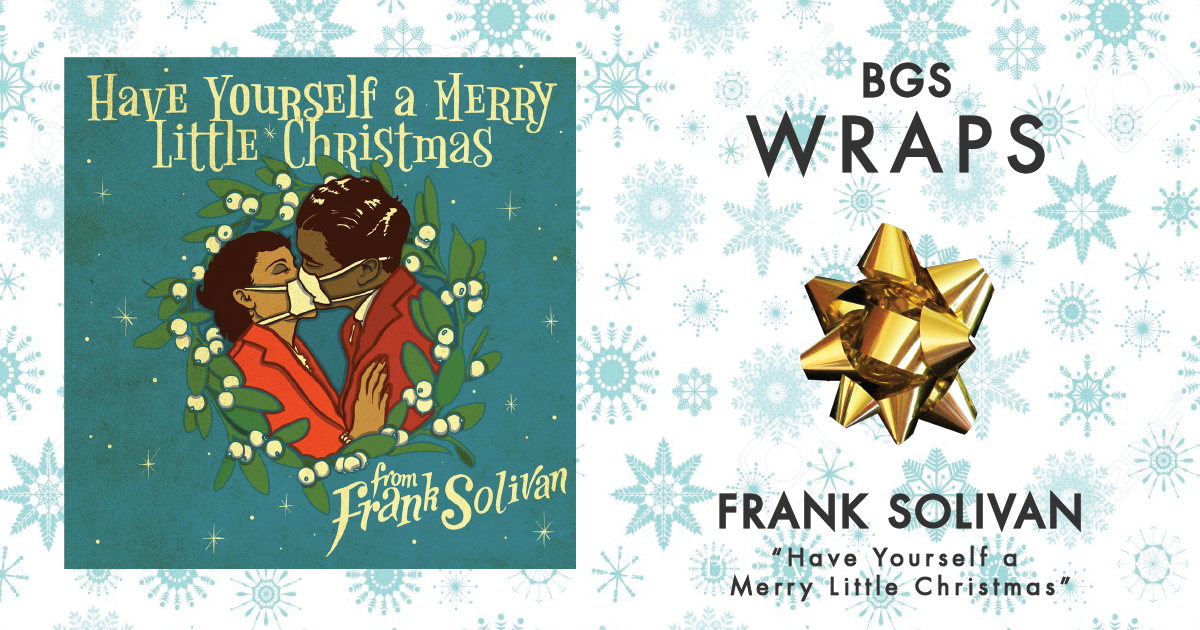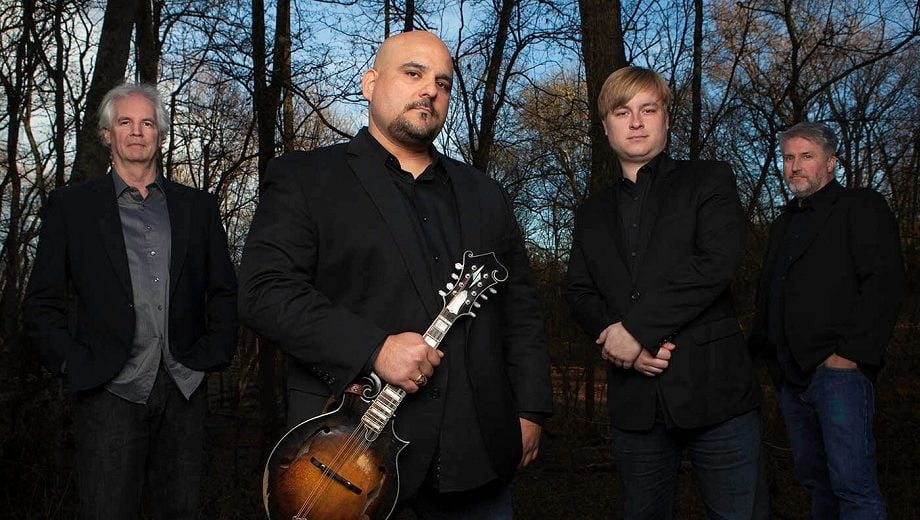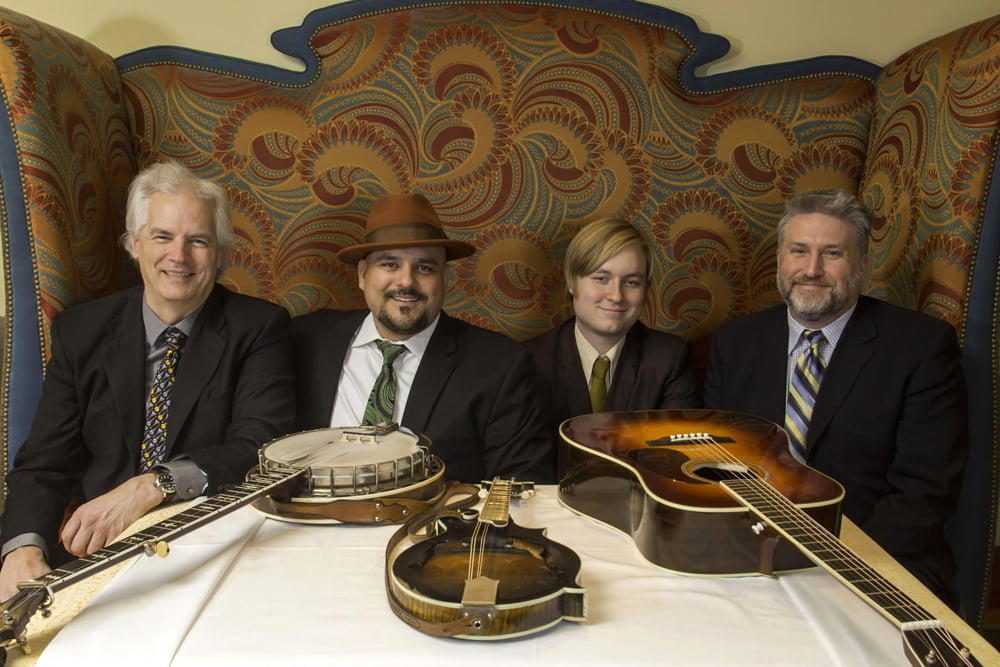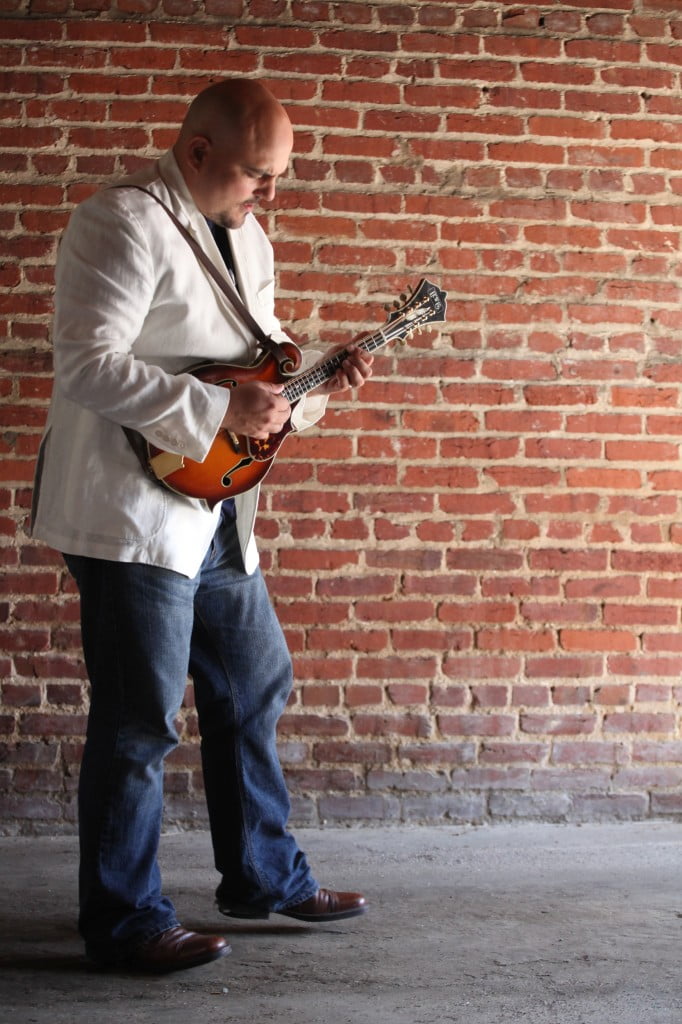When and how did you begin learning and playing music? Which artists and albums, as well as experiences with family and friends, inspired you to pursue music seriously?
Frank Solivan: I’ve never known a time when music wasn’t a guiding force. All of my life I’ve been surrounded by it. Both sides of my family play and sing. My mother Lorene plays some guitar and sings her butt off. She even sang a song on a solo project of mine Selfish Tears. Her brother plays guitar and sings, as did their dad. On her maternal side, there were plenty of concert violinists and cellists as well.
My dad is ninth of ten kids. His mom, my grandmother Bonnie played mandolin and fiddle. She even played and was a tumbler (acrobat) in Vaudeville shows. She passed along her love and respect for music and musical instruments to all of her ten kids and anyone associated with the family. Frequent gatherings of kin and friends with home cooked meals and live music was commonplace. Growing up with that made it natural for me to be involved with food and music.
I listened to Bill Monroe, Flatt and Scruggs, The Beatles, Elvis, Newgrass Revival, my family and anything else I could get my hands on. I reckon I was like a sponge. I loved everything music.
When did you begin writing your own music?
Frank: I started writing tunes on the fiddle when I was in high school. I also started writing songs then. It has always been a good outlet for me. You know, processing life and getting through hard times or expressing love in song still feels like the right thing to do.
Can you describe your experiences making I Am A Rambler? What were some of the most rewarding, surprising, and/ or challenging aspects for you?
Frank: I Am A Rambler came about when I moved to Nashville from Alaska to pursue some musical aspirations and left my future wife. We weren’t even a couple per say, but leaving a place that I loved so much and a woman I was falling in love with, gave me plenty of fodder to write some songs.
I traveled around in a few different bands, learned a ton of music, wrote a ton of music and kept dreaming of going back to Alaska and being with this wonderful woman that had my heart. One word that could easily describe that year away is, ‘lonesome’.
I ended up making some life long friendships and plenty of connections in Nashville at that time. My first ‘real’ studio project was under my belt and it got me set up for a better-seasoned second album.
How that that album prepare you for work on Selfish Tears?
Frank: Recording I Am A Rambler gave me plenty to chew on. It was recorded live in a studio with a great cast of talented musician. I love the energy and vibe, but there was something missing still. I thought about it quite a bit and decided to record another.
This time with the guys I was playing with all the time. Musicians I met outside the Navy Band. Basically, it was the guys that would start up FS&DK. Mike Munford on banjo, John Miller on guitar, and Stefan Custodi on bass. My pal Rob Ickes came in later to add some dobro. There was cohesiveness on Selfish Tears that you can hear and feel. That’s what I was after.
Which artists have been most influential to you as a player, collaborator, and songwriter?
Frank: When I was nine years old I saw Newgrass Revival for the first time. They blew my mind! I got to see the instruments that surrounded me in another light. I got to see their potential, see what they could do in other genres, and see how their role as rhythm and lead instruments dictated the way a song was interpreted by the listener. I eventually saw that I could get the same effect in my own playing.
When and how did you connect with the Dirty Kitchen players, and can you give us a run-down of the band members and what you see as their unique contributions to the band?
Frank: It basically started with Mike Munford (banjo). I met him at a DC nightclub that featured bluegrass once a week. I was invited up to play a song or two by the bandleader and it seemed like Mike wasn’t terribly thrilled. Maybe the thought of, ‘Oh great… another picker that wants to get in on this action’ or ‘Man… I hope this guy is good’ was crossing his mind. Ha… I jest.
As soon as we kicked off a song, sparks flew, musical magic was whirling around and a life long connection was made. He’s been a great friend and the only banjo player I know that can play fiddle tunes note for note and seamlessly move from genre to genre while keeping the integrity of a song, yet lending his own style to enhance it. He always plays the sounds that one would want to hear. An incredibly tasteful player he is.
I met Danny Booth (bass) when I moved to Alaska in the mid 90’s. He was only fourteen at the time… I was eighteen. Seems like he was just starting to get interested in music. With his dad Greg Booth and a few other pickers I met, we started up the band, Rank Strangers. I watched Danny grow musically. He even took a couple of mandolin lessons from me a few years later.
Eventually he ended up playing bass in the band Rank Strangers. I moved away from Alaska and he did as well. We always kept in touch and I feel like the Booth family is part of my family. When Stefan left the band, Danny was the first person I considered to fill the slot. Lucky for me, he ended up doing so!
When I met Chris, he was playing with his own band Northern Departure in the Seattle area where he’s from. We met at Wintergrass, a festival now held in Bellevue, Washington. We hit it off and jammed a couple of times there. We then linked up in Nashville the same year and picked a few more. Shortly there after, Lincoln told me he was planning on doing his own thing after the turn of the year and to keep an eye out for his replacement. The band had a January 2012 tour lined up in Alaska. Danny had just played his first tour with the band in December of 2011.
We linked up with Chris in Seattle at the hotel we were staying in and played some tunes. I asked him if he would fill in on the Alaska tour and he did so well and he was so prepared for the shows, I asked him to join the band at the end of the tour. Exactly one year from when we met at Wintergrass, we played that festival and announced his new employment from that stage. It is funny how things work out.
Everyone’s versatility, ideas and musical enthusiasm fits this band and has helped it to evolve into the amalgamate it is now.
Your last album, the self-titled Frank Solivan & The Dirty Kitchen, came next. What common threads connect the album to your previous ones, and what aspects do you feel set it most apart?
Frank: The main thing I think that sets this record apart from the others is that we recorded it as a band with arrangements that made the band shine as a unit. Of course there are solos and such where we all had an opportunity to shine, but the main thing was to make it sound like a band… like we all play together, like we all support one another.
We played some of the material out at live shows to get some of the tunes under our belt. We rehearsed before we went into the studio to learn and arrange new songs. We cut all of the songs pretty much live and that energy comes through.
The songwriting was fun. Most of the songs came to me fairly fast. Sometimes those are the best ones. Other songs like ‘July You’re A Woman’ we arranged and briefly deliberated on. Everything went really smooth. I think that is mostly attributed to all of us playing so much together and knowing what everyone’s strengths and weaknesses are.
Can you talk about where the name “Dirty Kitchen” comes from?
Frank: ‘Dirty Kitchen’ is a fiddle tune I composed while I was supposed to be cleaning my kitchen and it is the first track on I Am A Rambler. I wanted a band name that was different. One that made people ask and remember. It also signifies my love and passion for food.
My mother was in the restaurant industry and showed me how to cook at a young age. That led me to work in a couple of kitchens and I also worked for a catering service. My main job was prep, but my love for good food pushed me to keep learning more about the culinary arts. I now love cooking for friends and family. I love the connection between people at a dinner party as well. Sharing a good meal will ultimately bring people closer together and so will sharing good music. When you can do both at the same time, then it’s really magical.
That’s what I’ve been trying to do for some time now. Getting a model made that can incorporate both. We call it The Dirty Kitchen Experience. It’s like sharing the family gathering vibe I grew up with. That’s a really special feeling and I want people to experience it. Many fans of the band have had me cook and then play a house concert in their homes over the last few years. That’s what I love: really connecting with people and getting to know folks on a deeper level. Combining my passions has been a wonderful way to do so.
Can you talk about your songwriting process, including how collaborative it is with members of the band?
Frank: Sometimes songs come easier than others. For instance, on our last project, ‘Left Out In The Cold’ and ‘Driftin’ Apart’ were written in about 30 minutes. I need space to write and a clear head. It needs to be quiet and I need to be alone.
This new project includes songs that were co-written. ‘On The Edge Of Letting Go’ is a song that touches on mental illness and relationship troubles therein, inspired by a family member. I wrote it in a hotel room with my pal Jon Weisberger, a respected journalist and award winning songwriter.
‘No Chance’ was also written with him and another friend of mine, Paul Fowler. It is about the ups and downs of alcoholism. Both songs seemed pretty easy to write. I now love writing with other people that are on the same page as me.
As far as writing with the band, we haven’t done any of that yet. We did however arrange an instrumental of mine and everyone contributed. All of the songs were arranged by all of us together before we even got to the studio. That’s a fun process! Everyone really gets into it and shares their ideas. I always say, ‘You have to hear it to hate it’. Meaning let’s try it before we say nay.
Did you have a preconceived vision for the new album? What were your goals and aspirations this time around?
Frank: My goal for this project was for the band’s sound to really be the feature. Even though everyone has their chance to shine, we all contributed to making it sound cohesive. I didn’t want to make just a formulaic bluegrass record either. I wanted to make music that is for everyone. Music that is accessible, repeatable at a live show and hopefully something that can be listened to 30 years from now.
What was most intuitive for you individually, as well as a band, making this album?
Frank: Energy comes most naturally for everyone in the band. I think everyone was inspired when we were recording. We had great material that we put time and energy into and we were excited to capture our ideas on tape for all to hear.
Was there a song(s) that set the course for the new album?
Frank: There are a couple of songs on the new album that we snuck in under the bluegrass radar. There are two songs that were written by my cousins. ‘Gone’ was written by Megan McCormick and ‘Too Far Gone’ was written by Ty Smith. Both have different rhythms that lend to the more acoustic rock and bluesy side of things. Maybe even the Allman Brothers influence comes through a bit. I love being able to jam out on groove-based tunes like those.
What were you listening to and inspired by during the writing process, as well as the recording process?
Frank: I listen to all kinds of music, so I can’t narrow it down to one thing that inspired my writing. As far as recording… Really, I was buried in the music. Totally consumed with critical listening of the takes, solos and vocals. I didn’t leave much room for any other music to come into the recording world.
What are some of your non-music sources of inspiration?
Frank: The last handful of years, I’ve been tinkering around and doing most of my set up work. Making nuts, bridges, installing frets and the like. Some small repairs here and there. My good friend and master luthier, Michael Lewis has always been an inspiration. I’ve known him most of my life and he gave me a beautiful mandolin to play about 12 years ago. I play with it and record with it all the time.
I’ve seen the mandolin building process and have always been intrigued. I’ve always wanted to build one and last year another good friend of mine, also a master luthier, Roger Siminoff invited me to join in on his week long, total immersion luthier workshop. Where you build an F5 mandolin using Lloyd Loars own personal axe as the example. Roger owns a piece of mandolin history. Lloyd Loar was a virtuoso mandolin player and acoustic engineer for Gibson in the early 20’s and his signed ‘Master Model’ instruments have been known to sell for $250K! This was Loar’s personal instrument. In the class we got to hear it, play it and use it for reference while building a copy of it. It is very cool indeed.
In my spare time, I’ve been trying to finish building this project and I recently strung it up in the white to get an idea of how it sounds and to my surprise, it’s a hoss! I reckon that it still musically related, but it has been a good source of inspiration.
Can you talk about your passion for cooking and your Dirty Kitchen cooking classes?
Frank: Cooking is a great release for me. Coming up with new recipes and dishes definitely accesses my creative side. I have only done one cooking class. I was so happy that I was able to connect with folks that way. I even brought my mandolin and played a couple of songs while things were cooking.
I hope to make this a regular occurrence. I am going to continue incorporating food and music at the same time. It’s who I am and what I’m about. We are working on a video trailer and pitch to get our ideas in a documentary and on television. Stand by for more on that.



